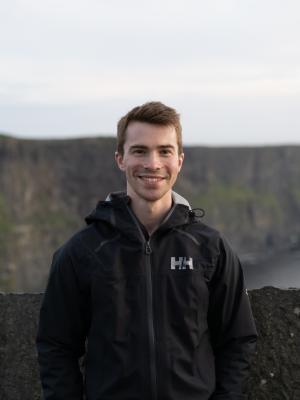Ian Coxon

M.Sc. candidate (geology)
Email: inacoxon@mun.ca
Thesis title: The Great Oxidation Event: Exploring new geochemical evidence for Earth’s earliest atmospheric oxygenation in the 2.3 Ga Lorrain Formation (Ontario, Canada)
Supervisor: Dr. Michael Babechuk
Research Interests: My current research examines the interplay between the Paleoproterozoic Great Oxidation Event (GOE) and ancient surficial geochemical processes with a focus on the behaviour of redox sensitive trace-elements. The GOE represents the first rise in free atmospheric oxygen in Earth’s history and has been linked to shifts in terrestrial chemical weathering dynamics (i.e., oxic chemical weathering in paleosols), the evolution of early life, and global-scale climate dynamics (i.e., the Huronian glaciations). I am currently examining clastic sedimentary rocks from the Lorrain Formation, part of the upper Huronian Supergroup (Ontario/Quebec, Canada), that were deposited during the GOE. Through my M.Sc. research, I hope to shed light on how environmental oxidation influenced the cycling of redox sensitive trace-elements (e.g., Mo, Cr, U, Ce, etc) within ancient terrestrial and fluvial environments. My research is multidisciplinary and combines field sampling, petrography, trace-element geochemistry, and sequential chemical extractions to examine geochemical processes that would have acted upon Earth’s ancient surface world.
During my undergraduate studies, I completed an honour’s project with Dr. Penny Morrill focused on the characterization of microbial communities within ultra-basic groundwater springs hosted in serpentinized ultra-mafic rocks of the Bay of Islands Ophiolite Complex (Newfoundland, Canada). The ultra-basic springs hosted within these ophiolites support extremophile microbial life with unique metabolic pathways adapted to high pH, reducing environments. The ultra-basic serpentine-hosted springs examined in western Newfoundland are analogous to those that have been remotely detected on Mars, making them excellent sites for studying potential life-supporting environments on our planetary neighbour. I continue to conduct field work with Dr. Morrill’s research group and have had the privilege of working in some of western Newfoundland’s most spectacular, and otherworldly field locations.
If you have any questions regarding any of my past, current, or future research please feel free to email me. Additional information about my current research group, lead by Dr. Michael Babechuk, can be found at http://www.mbabechuk.com/
Research Funding: My graduate research is currently supported by my supervisor, a fellowship from the Society of Graduate Studies, the F.A. Aldrich Fellowship, the NSERC CGS-M program, and the Society of Economic Geologist’s Graduate Student Fellowship and Student Research Grant programs.
Other Interests: Outside the office I spend most of my time cycling, mountain biking, or hiking the East Coast Trail